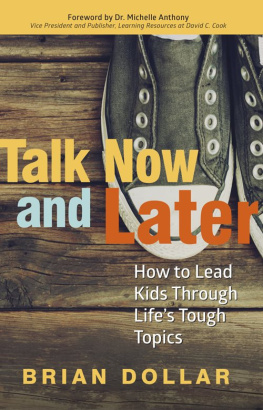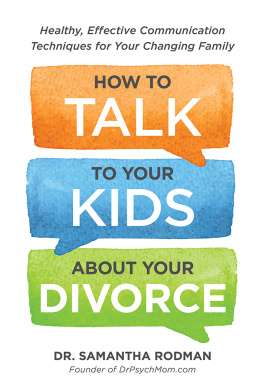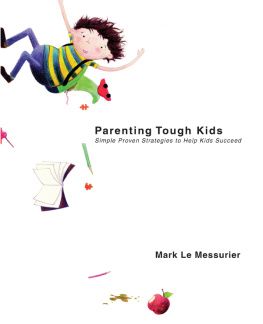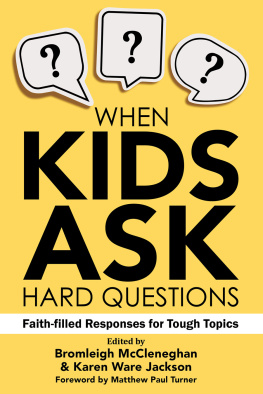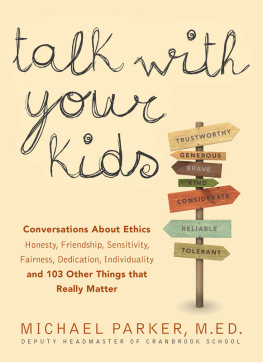"we need
to talk"
Tough Conversations
with your
Kids
From Sex to Family Values
Tackle Any Topic with Sensitivity and Smarts.
RICHARD HEYMAN, ED. D.

Copyright 2009 by Richard Heyman
All rights reserved. This book, or parts thereof, may not be
reproduced in any form without permission from the publisher;
exceptions are made for brief excerpts used in published reviews.
Published by
Adams Media, an imprint of Simon & Schuster, Inc.
57 Littlefield Street, Avon, MA 02322. U.S.A.
www.adamsmedia.com
ISBN 10: 1-59869-878-8
ISBN 13: 978-1-59869-878-7
eISBN: 978-1-44052-089-1
Printed in the United States of America.
J I H G F E D C B A
Library of Congress Cataloging-in-Publication Data
is available from the publisher.
This publication is designed to provide accurate and authoritative information with regard to the subject matter covered. It is sold with the understanding that the publisher is not engaged in rendering legal, accounting, or other professional advice. If legal advice or other expert assistance is required, the services of a competent professional person should be sought.
From a Declaration of Principles jointly adopted
by a Committee of the American Bar Association
and a Committee of Publishers and Associations
This book is available at quantity discounts for bulk purchases.
For information, please call 1-800-289-0963.
Contents
Preface
Where do babies come from? your five-year-old son asks during his afternoon snack.
Why do you want to know? you reply, ducking a really tough question with another question.
I just want to know.
I thought I told you when your sister was born.
I dont remember.
I dont want to talk about it just now.
Why?
I just need some time to think about it.
Whats wrong with this picture? Is it that a five-year-old is interested in something to do with sex? Or is it that you think you cant answer his question without embarrassing yourself, so pass on it for the time being?
Of all the difficult topics of conversation that might come up for parents and children of any age, sexuality probably tops the list. Thats why most parents try to avoid the topic completely and hope their kids will learn about it from someone else. But there is no shortage of other tough topics moms and dads, at sometime or other in their childrens lives, will need to talk about: right and wrong, fighting, rules, drugs, death of a person or pet, children who are different, proper behavior toward the opposite sex, money, toys and clothes, schoolwork, choices and moral development, separation and divorce, money, alcohol, drugs, and cigarettes.
We Need to Talk: Tough Conversations with Your Kids is a clear and sympathetic guide through this mythical minefield of difficult conversations. I call it mythical because the truth is, any topic can be discussed with children of any age in an honest way, as long as parents carefully choose their words and examples and speak with the tone and tact befitting their childs age, gender, and ability to understand. Using vivid examples, expert commentary, and useful scripts, this book gives parents those words and examples and shows how to fit them to their own children, whether they are preschoolers, grade school children, or teens.
Introduction
Tone and TactFinding
the Right Words for
Your Child at Any Age
IF YOU THINK parents have trouble talking to their children about some topics more than others, youre right. But if you think thats because those topics are intrinsically too tough, youre wrong. Not only can every parent talk about any topic to any child, they can do it easily and truthfully. It doesnt matter if youre shy or bold, easily embarrassed or unshockable, Type A personality or Type B, woman or man, mother or father, extrovert or introvert. You just have to know what to say and how to say it.
Tough Talk with a Tough TeenA True Story
My wife and I have three children, including a son who, when he was a child, wouldnt accept us as having any authority over him. Our other two children acknowledged us as their parents, listened to what we had to say, and did what we asked. We could talk to them about anything.
Our son argued with us over almost everything. He did poorly in school, but had lots of friends. As he grew up, he proved to be very inventive and very skilled with machines. However, by the time he reached eighteen he was neither in school nor working. We decided the best thing for him and for us was to ask him to leave home. Our problem was how to do it. What could we say to our child to get him to move out? More importantly, what could we do to get to him to understand our point of view and why we thought it would be better for him and for us if he made his own way? Since he had always rejected our authority and was of legal age, we felt he needed to be his own boss in his own apartment.
Our concern was that he understood we were doing this not because we wanted to but because we had to, for his sake; he needed to be responsible for his own life. We confronted him in his own room, my wife and I, and by the time we were finished we were both crying. This is roughly how the conversation went:
US: Were sorry, darling, but we think the time has come for you to move out. Right now youre using our house as a hotel. Youre not working and youre not going to school. If you were, wed be happy to have you live here as you always have and wed support you. But youre not, so we think it would be best for you, and for us, if you moved out. We love you, but we need you to go.
We didnt want to sound unfeeling, but we needed to be firm. We bothhated saying this, but we felt we had no choice. He was a seriouslydisruptive part of our family. We also wanted him to know he had optionsschool and or work.
HIM: So, what do you want from me?
He was never easy to have a conversation with and this, of course, was onehe certainly didnt want to havenor did we.
US: Just what we said: you have to leave.
We had both agreed beforehand that we wouldnt back down. If we did,things would never change for him, and would actually probably go frombad to worse. We were using what was called tough love, to be used onlywhen all else fails.
HIM: Where can I go?
We knew he had some options, including a really close friend who hadmoved into his own apartment and whose father we knew very well.
US: You have lots of friends. What about moving in with Martin? We think you will be better off staying with him, if hell let you.
HIM: What if he wont have me? Where do I go?
US: Well help you look if you want.
And we would have, if it had been necessary. But we wanted this to be hisfirst real taste of the freedom and responsibilities that come with being onyour own.
HIM: How soon do you want me to leave?
This is where we started crying.
US: Wed like you to be out by the weekend if you can arrange it. Well help you move if you need our help.
We didnt want to give him too much time or we were afraid we might backdown, and that was something we didnt want to do.
HIM: Okay, Ill call Martin.
US: Okay, lets hope hell have you. Please know that we love you very much; youre our son and we only want the best for you. But we cant go on this way and thats why you have to leave. If you ever decide you want to go back to school or if you get a job and need to live here, wed welcome you back.
Next page


